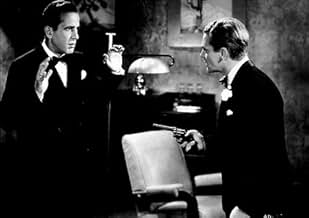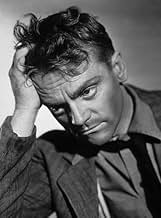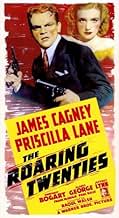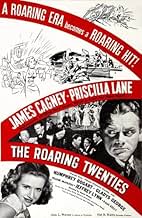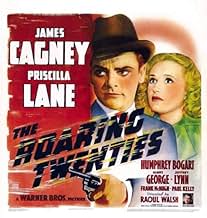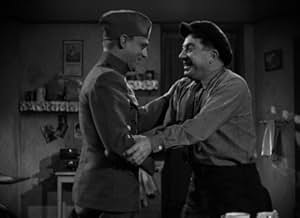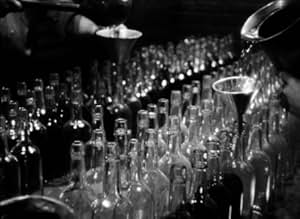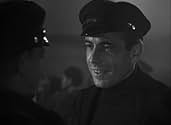IMDb-BEWERTUNG
7,9/10
16.363
IHRE BEWERTUNG
Zwei ehemalige arbeitslose Kriegskameraden (James Cagney und Humphrey Bogart) verdienen sich nach dem Ersten Weltkrieg ihren Unterhalt als Alkoholschmuggler.Zwei ehemalige arbeitslose Kriegskameraden (James Cagney und Humphrey Bogart) verdienen sich nach dem Ersten Weltkrieg ihren Unterhalt als Alkoholschmuggler.Zwei ehemalige arbeitslose Kriegskameraden (James Cagney und Humphrey Bogart) verdienen sich nach dem Ersten Weltkrieg ihren Unterhalt als Alkoholschmuggler.
- Auszeichnungen
- 2 wins total
Elisabeth Risdon
- Mrs. Sherman
- (as Elizabeth Risdon)
Edward Keane
- Henderson
- (as Ed Keane)
Eddy Chandler
- Second Detective
- (as Eddie Chandler)
John Deering
- Narrator
- (Synchronisation)
Handlung
WUSSTEST DU SCHON:
- WissenswertesThis marked the end of James Cagney's cycle of gangster films for Warner Bros. Cagney wanted to diversify his roles: he would not play a gangster again until Maschinenpistolen (1949), ten years later.
- PatzerWhen Eddie and his men impersonate the Coast Guard, there's a miniature shot of the two boats pulling alongside each other. Nick's rum runner boat that George captains is a much taller boat and its deck is higher above the water than the smaller vessel. Yet when the shot changes to live action and Eddie's crew is throwing mooring lines across to the bigger boat, the decks are now the same height; furthermore, when the men cross from one boat to the other, they merely step over the rail instead of needing to climb up to the taller boat's deck.
- Zitate
[last lines]
Panama Smith: He's dead.
Cop: Well, who is this guy?
Panama Smith: This is Eddie Bartlett.
Cop: Well, how're you hooked up with him?
Panama Smith: I could never figure it out.
Cop: What was his business?
Panama Smith: He used to be a big shot.
- VerbindungenEdited from Der öffentliche Feind (1931)
- SoundtracksI'm Just Wild About Harry
(1921) (uncredited)
Music by Eubie Blake
Lyrics by Noble Sissle
Played during the opening and closing credits
Also played during the 1922 montage
Sung by Priscilla Lane at the club
Ausgewählte Rezension
Sometimes I come to a film because it looks like it can directly fulfill, sometimes because it can provide precious background to other things that matter, letting them stand.
It's watchable in itself, this one; a misfit's rise and fall played against the passing of times. Released on the cusp of WWII, it opened a portal back to more careless times, taking us on a journey from WWI trenches through the highs of Prohibition to the lows of Depression, so we could have this clear moral stance: in the new world there's no room for scoundrels. Right.
Interesting here is that only a year or two before Citizen Kane we have a similar saga about the passing of the times, but one that asks no fundamental question of us, casts no doubt on its testimony. It's as lurid and constructed as newspaper headlines of the time, a main contrast in Welles' film about its world-creating newspaperman. It's machinegun history written in the staccato sounds of a newspaperman's typewriter.
What I really wanted to see though was Cagney.
I am in the middle of a film noir quest looking for its machinery, and as an aside I was brought to explore its roots in 1930's crime stuff. Cagney is a force in this niche. He had so much energy that he could turn into presence. He is not just amused, he doesn't coast on pushing things back like Bogart; he throws himself on the encounter, bitterly cutting himself on the edges.
Not so here. He was asked to play a basically decent guy led astray by the prospect of easy money, meaning to reflect the broader American endeavor that ended on Black Tuesday. Usually in a Cagney film he lets loose in the end. They asked of him here the precise opposite; he sleepwalks, numbed by failure, a human ruin clawing at redemption. He looks like he gives it his all, but it's just not who he is. It's as if you asked Welles to strut like Wayne.
If you want to see Cagney in top form, look him up in Footlight Parade fully in command of a show, White Heat to see him face real demons.
It's watchable in itself, this one; a misfit's rise and fall played against the passing of times. Released on the cusp of WWII, it opened a portal back to more careless times, taking us on a journey from WWI trenches through the highs of Prohibition to the lows of Depression, so we could have this clear moral stance: in the new world there's no room for scoundrels. Right.
Interesting here is that only a year or two before Citizen Kane we have a similar saga about the passing of the times, but one that asks no fundamental question of us, casts no doubt on its testimony. It's as lurid and constructed as newspaper headlines of the time, a main contrast in Welles' film about its world-creating newspaperman. It's machinegun history written in the staccato sounds of a newspaperman's typewriter.
What I really wanted to see though was Cagney.
I am in the middle of a film noir quest looking for its machinery, and as an aside I was brought to explore its roots in 1930's crime stuff. Cagney is a force in this niche. He had so much energy that he could turn into presence. He is not just amused, he doesn't coast on pushing things back like Bogart; he throws himself on the encounter, bitterly cutting himself on the edges.
Not so here. He was asked to play a basically decent guy led astray by the prospect of easy money, meaning to reflect the broader American endeavor that ended on Black Tuesday. Usually in a Cagney film he lets loose in the end. They asked of him here the precise opposite; he sleepwalks, numbed by failure, a human ruin clawing at redemption. He looks like he gives it his all, but it's just not who he is. It's as if you asked Welles to strut like Wayne.
If you want to see Cagney in top form, look him up in Footlight Parade fully in command of a show, White Heat to see him face real demons.
- chaos-rampant
- 10. Sept. 2013
- Permalink
Top-Auswahl
Melde dich zum Bewerten an und greife auf die Watchlist für personalisierte Empfehlungen zu.
- How long is The Roaring Twenties?Powered by Alexa
Details
- Erscheinungsdatum
- Herkunftsland
- Sprache
- Auch bekannt als
- The Roaring Twenties
- Drehorte
- Produktionsfirma
- Weitere beteiligte Unternehmen bei IMDbPro anzeigen
- Laufzeit1 Stunde 46 Minuten
- Farbe
- Sound-Mix
- Seitenverhältnis
- 1.37 : 1
Zu dieser Seite beitragen
Bearbeitung vorschlagen oder fehlenden Inhalt hinzufügen

Oberste Lücke
What is the Brazilian Portuguese language plot outline for Die wilden Zwanziger (1939)?
Antwort

